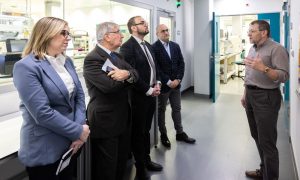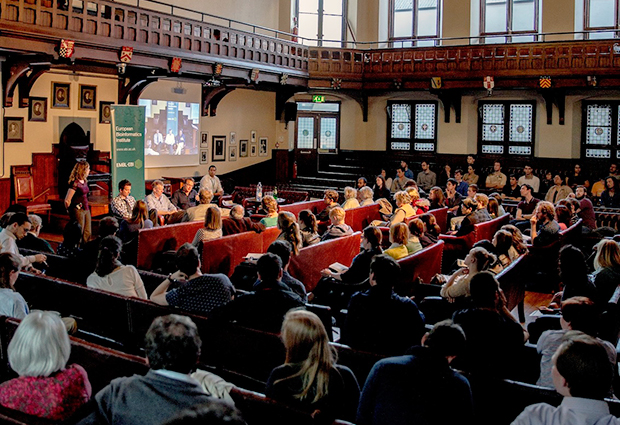
Read the latest Issue
The threat of rapidly spreading infectious disease has long captured public imagination – and the sheer scale of the Ebola crisis has brought the risk of a pandemic to the forefront of people’s minds. The topic seemed a timely choice for EMBL-EBI’s ninth annual Science and Society evening: ‘Pandemic! The global threat of deadly diseases’.

More than 130 visitors bustled into the Cambridge Union Society for the event on 3 June. The evening featured three expert speakers from different fields, who outlined the risks posed by infectious diseases, how they come about and what we can do to prevent future outbreaks.

Halldór Stefánsson, Head of EMBL’s Science and Society Programme, opened the event chaired by Scientific Engagement Officer Katrina Costa. Kicking off the talks was Derek Smith (University of Cambridge), who discussed past outbreaks and pandemics, how they were dealt with and how we can be better prepared. Oliver Billker, a faculty member at the Wellcome Trust Sanger Institute, then gave a case study of his research into malaria, explaining why we are still unable to beat a pathogen that causes almost 600 000 deaths worldwide each year.
The concluding talk was given by Kristian Andersen, a research fellow at Harvard University, who works in collaboration with local hospitals in Sierra Leone to develop better diagnostic tools for Ebola. “These kinds of diseases are not just a problem in West Africa,” he emphasised, “It’s a global problem.” He shared insights on how countries deal with pathogenic viruses, warning: “Getting to zero cases does not mean staying at zero. It’s critical that we keep investing in the healthcare infrastructure in West Africa so the next outbreak can be stopped at the first case. We have not seen the end of Ebola – we need to know that it’s there and be able to diagnose it faster.”
We have not seen the end of Ebola – we need to know that it’s there and be able to diagnose it faster.
The talks inspired a lively 45-minute Q&A with the speakers. “There were so many questions – many more than at most regular talks,” said Marco Galardini, a postdoc in EMBL-EBI’s Beltrao group. Discussions then moved to the bar, for the opportunity to mingle and network over drinks and snacks.
EMBL’s Science and Society Committee will soon make plans for next year’s event, which is likely to be held at the same venue in June 2016.

Looking for past print editions of EMBLetc.? Browse our archive, going back 20 years.
EMBLetc. archive